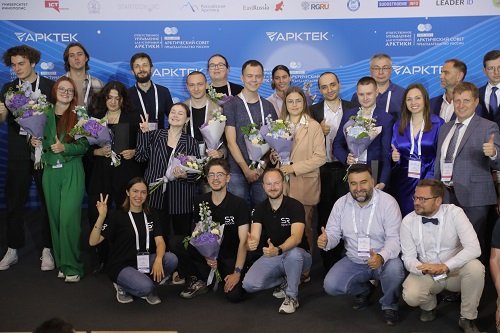The winners of the ArcTech Data contest included projects to analyse mining risk, assess tourism demand for the optimal development of infrastructure, and improve medical care in the Arctic. The ArcTech Data contest, which took place in St. Petersburg on 11 August 11, is part of the 2023 Arctic Technology Contest (ArcTech) and among the events of Russia’s chairmanship of the Arctic Council in 2021-2023, which are managed by the Roscongress Foundation.
“You can only manage what you can properly understand and analyse, which means you need to be a data management master. This is why one of our contests is called ArcTech Data. What were we expecting from the contestants Practical solutions that will improve people’s lives, introduce innovations, and improve infrastructure in the Arctic. So, we evaluated the applicability of the solutions in practical life, the extent to which modern data processing algorithms and technologies, such as artificial intelligence, are used, the friendliness of the interface of the services developed by the contestants, as well as the team’s willingness to introduce what they had started. We selected the winners based on these criteria,” Eastern State Planning Centre Director Mikhail Kuznetsov said.
The ArcTech Data contest brought together more than 110 product and IT teams. The participants spent two months developing digital services as part of three pillars of sustainable development: ‘Arctic Ecology’, ‘Arctic Tourism’, and ‘Arctic Urbanization’. The winning project in each of the three pillars received funding to further develop solutions. The prize fund is RUB 500,000 for first place, RUB 350,000 for second, and RUB 150,000 for third.
“The ArcTech contest provides us with an opportunity to talk about the development of a branch of engineering management that is increasingly in demand. We see that narrow specializations are important, but an interdisciplinary integrated approach to working in the new conditions is also crucial. ArcTech is a platform that aims to integrate interests and efforts, the potential of science, economic operators, industrial companies, regions, cities, and municipalities to help strengthen Russia’s technological sovereignty in high latitudes. Obviously, it would make sense to think about establishing an institution of partners of the ArcTech contest in order to give it an external dimension. The Arctic has turned into a territory where the most advanced resource-saving territories are created and tested. It is a unique testing ground. We see how the role of the Arctic region is growing as part of the global energy transition,” said Nikolay Korchunov, Ambassador-at-Large of the Russian Ministry of Foreign Affairs and Chair of the Senior Arctic Officials.
In the ‘Arctic Ecology’ pillar, the teams developed systems to analyse risks associated with mining, as well as services to optimize the location of pollution monitoring or waste collection facilities in the Arctic. Based on the test results, the SR Data team had the best results with its presentation of the Arctic Data project. This solution will help calculate the risk of fires in the Arctic based on an analysis of the amount of annual precipitation, visualize oil slicks and spills in the northern waters, and track the littering of water areas.
As part of the ‘Arctic Tourism’ pillar, the teams studied the Arkhangelsk Region in order to create a tool to assess demand for tourism in terms of optimizing infrastructure development. The best project was the White Horizon digital service from the Ladno team to assess tourism demand in the Arkhangelsk Region and optimize the placement of future tourism sites. The platform will help tourists plan their trips thanks to its large amount of information and will allow businesses to advertise their services by providing companies with a hit-map and visual recommendations about the ability to start a business in a particular area.
In the ‘Arctic Urbanization’ pillar, the developers created solutions to optimize the placement of urban facilities taking into account transport accessibility or to identify settlements with limited access to medical care. The Department team won the contest. Their ARCTIDA geo-service analyses the data of government agencies and the coordinates of medical facilities, and maps out areas with low availability of medical care to help the regional authorities in Russia’s Arctic zone improve the situation with healthcare in these areas.
The final of the ArcTech Data contest took place at the Mikhailovskaya Dacha campus of the Graduate School of Management of St. Petersburg State University. The contest included the roundtable ‘Arctic Development Strategy: Key Skills To Unlock the Potential of the Russian Arctic’, as well as strategic sessions.
The event was organized by the Ministry for the Development of the Russian Far East and the Arctic and the Eastern State Planning Centre. The Russian Ministry of Foreign Affairs was the partner of the event, which was attended by representatives of St. Petersburg State University, Sovcomflot, Medsi, MMC Norilsk Nickel, MegaFon, Rosatom, the Centre for Spatial Research (Geointellect), and Yandex.
The ArcTech contest aims to transform scientific and technological developments into digital ones and create engineering solutions to ensure comfortable living conditions for people in the Arctic and the successful operation of companies in the region. The contest programme includes three focuses: ArcTech Data, ArcTech Engineering, and ArcTech Science Pitch. The overall prize fund of the Arctic Technology Competition 2023 is RUB 10 million. The final round and awards ceremony of the ArcTech Engineering and ArcTech Science Pitch contests will take place on 24 November 2023.










